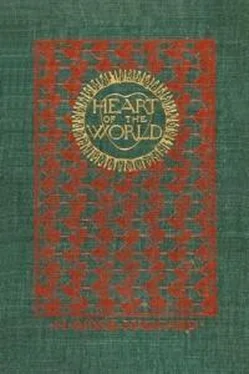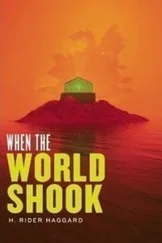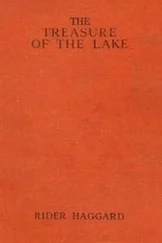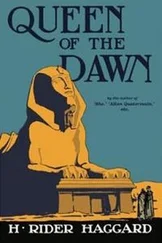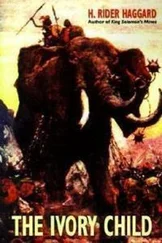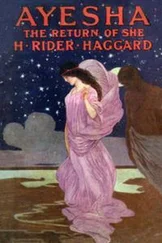"No; but we can leave her here gagged and bound till they chance to find her," answered the señor. "Hearken, Nahua, we spare you, and to do it go forth to our own deaths. May your fierce heart learn a lesson of mercy from the deed. Farewell."
Two hours had gone by, and three figures, wrapped in rough serapes , such as the common people wore, one of whom, a woman, carried an infant in her arms, might have been seen cautiously descending the city wall by means of a wooden ladder that ran from its summit to a jetty built upon piers at the foot of it, which was used as a mooring–place for boats during the months of inundation. As was common at this season of the year, the lake was already rising, and floating in the shallow water at the end of the jetty lay a pleasure–skiff which the señor and I were accustomed to use for the purpose of fishing whenever we could escape for a few hours from our wearisome life in the city.
Into this skiff we entered, and, having hoisted the sail, set our course by the stars, steering for that village whence, a year before, we had embarked for the City of the Heart. The wind being favourable to us, our progress was rapid, and by the first grey light of dawn we caught sight of the village not a mile away. Here, however, we did not dare to land, for we should be seen and recognised; therefore we beached our boat behind the shelter of some dwarf water–palms three furlongs or more below the village, and, having hidden it as well as we were able, set out at once towards the mountains.
Passing round the back of the village without being seen, for as yet folk were scarcely astir, we began our dreadful journey. For a while Maya bore up well, but as the heat of the day increased she showed signs of tiring, which was little to be wondered at, seeing that she carried in her arms a child not three weeks old. At mid–day we halted that she might rest, hiding ourselves beneath a tree by the banks of a brook, and eating of such food as we had brought with us. In the early afternoon we started on again, and for the rest of that dreary day struggled forward as best we could, the señor and I carrying the infant alternately in addition to our other burdens.
At length the evening fell, and we camped for the night, if camping it can be called, to sleep beneath the shadow of a cedar–tree without fire and with little food, having no covering except our serapes . Towards morning the air grew cold, for already we were at some height above the lake, and the tender infant began to wail piteously—a wail that wrung our hearts. Still we rose with the sun and went on our way, for it seemed that there was nothing else to do. Throughout that day, with ever–wearying footsteps, we journeyed, till at sunset we reached the snow–line, and saw before us the hunter's rest–house where we had slept when first we entered the Country of the Heart.
"Let us go in," said Maya, "and find food and shelter for the night."
Now, our plan had been to avoid this house and gain the pass, where we proposed to stay till daybreak, and then to travel down the mountain slopes into the wilderness.
"If we enter there, Maya, we shall be trapped," said the señor; "our only safety lies in travelling through the pass before we are overtaken, for it is against the law that any of your people should follow us into the wilderness."
"If we do not enter, my child will die in the cold," she answered. "You were too tender to secure our safety by putting that would–be murderess to death; have you, then, the heart, husband, to kill your own child?"
Now at these words I saw the señor's eyes fill with tears, but he said only:
"Be it as you will."
By now, indeed, we understood—all three of us—that if we would save ourselves we must suffer the child to die, and, however great our necessity, this we could not do. So we went up to the house and entered, and there by the fire sat that same man and his wife whom we had found in this room a year ago.
"Who are you?" he cried, springing up. "Pardon, Lady, but in that garb I did not know you."
"It is best that you should not know us," said Maya. "We are wanderers who have lost our way out hunting. Give us food, as you are bound to do."
Then the man and his wife, who were kindly people, made obeisance to us, and set of the best they had before us. We ate, and, after eating, slept, for we were very weary, bidding the man watch and tell us if he saw any stranger approaching the house. Before dawn he woke us, and we rose. A little later he came into my room and told me that a large body of men were in sight of the house. Then I knew that it was finished, and called the others.
"Now, there are three things that we can do," I said: "fly towards the pass; defend this house; or surrender ourselves."
"There is no time to fly," answered the señor, "therefore it is my counsel that we fight."
"It is your counsel that two men armed with bows" (for our firearms had been taken from us on the pyramid, and we had never been able to recover them) "should engage with fifty. Well, friend, we can try it if you wish, and perhaps it will be as good a way of meeting our deaths as any other."
"This is folly," broke in Maya; "there is but one thing to do; yield ourselves and trust to fortune, if, indeed, fortune has any good in store for us. Only I wish that we had done it before we undertook this weary journey."
As she spoke, by the light of the rising sun we saw a great number of men forming a circle round the house. With them were several captains and lords, and among these I recognised Dimas and Tikal.
"Let us put a bold face on it," said Maya. So we opened the door, walked out, and came into the presence of Tikal, Dimas, and the other lords.
"Whom do you seek, that you come with an armed force?" asked Maya.
"Whom should I seek but your fair self, cousin?" answered Tikal—and I saw that his eye was wild, as though with drink. "If Nahua, my wife, had her way, she would have let you go, for she desires to see the last of you; but her will is not my will, nor her desire my desire, and as it chances we have come up with you in time."
Maya turned from him with a scornful gesture, and addressed herself to Dimas, saying:
"Tell us of what we are charged that you follow us as though we were evil–doers."
"Lady," the old priest answered gravely, "it would seem that you have earned this name, you and your companions together. Listen: two days since you were missing, and the Lady Nahua was also missing. Search was made, and at last your private apartments were broken open, and there she was discovered bound and gagged. From her we learned the secret of your flight, and followed after you."
"Did she, then, tell you why we fled?" asked Maya. "Did she tell you that she crept to my chamber like a thief in the night, and there was found in the act of doing murder on my child?"
"No, Lady, she told us nothing of all this. Indeed, her manner was strange; for, so soon as she was recovered somewhat, she took back her words, and said that she knew naught of you or of your plans, and that if you had fled we should do well to let you go before worse things happened. But, knowing that for all this she had reasons easy to be guessed, we followed and found you, and now we arrest you to answer before the Council for your great sins, in that you have broken your solemn oaths by attempting to leave the land without the consent of the Council, and have added to your crimes by taking with you this child, the Heaven–sent deliverer, on whom rest the hopes of our race."
"If we have broken our oaths," said Maya, "we broke them to save our lives. Were we, then, to stop in the city till the knife of the assassin found us out? On the very night of my marriage a murderer was set upon my husband, and perhaps one stands there"—and she pointed to Tikal—"who could tell us who he was and whence he came. Three days ago another murderer sought the life of our child, and that murderer the wife of the Lord Tikal. Is it, then, a sin that we should take from the land one whose life is not safe within it."
Читать дальше
